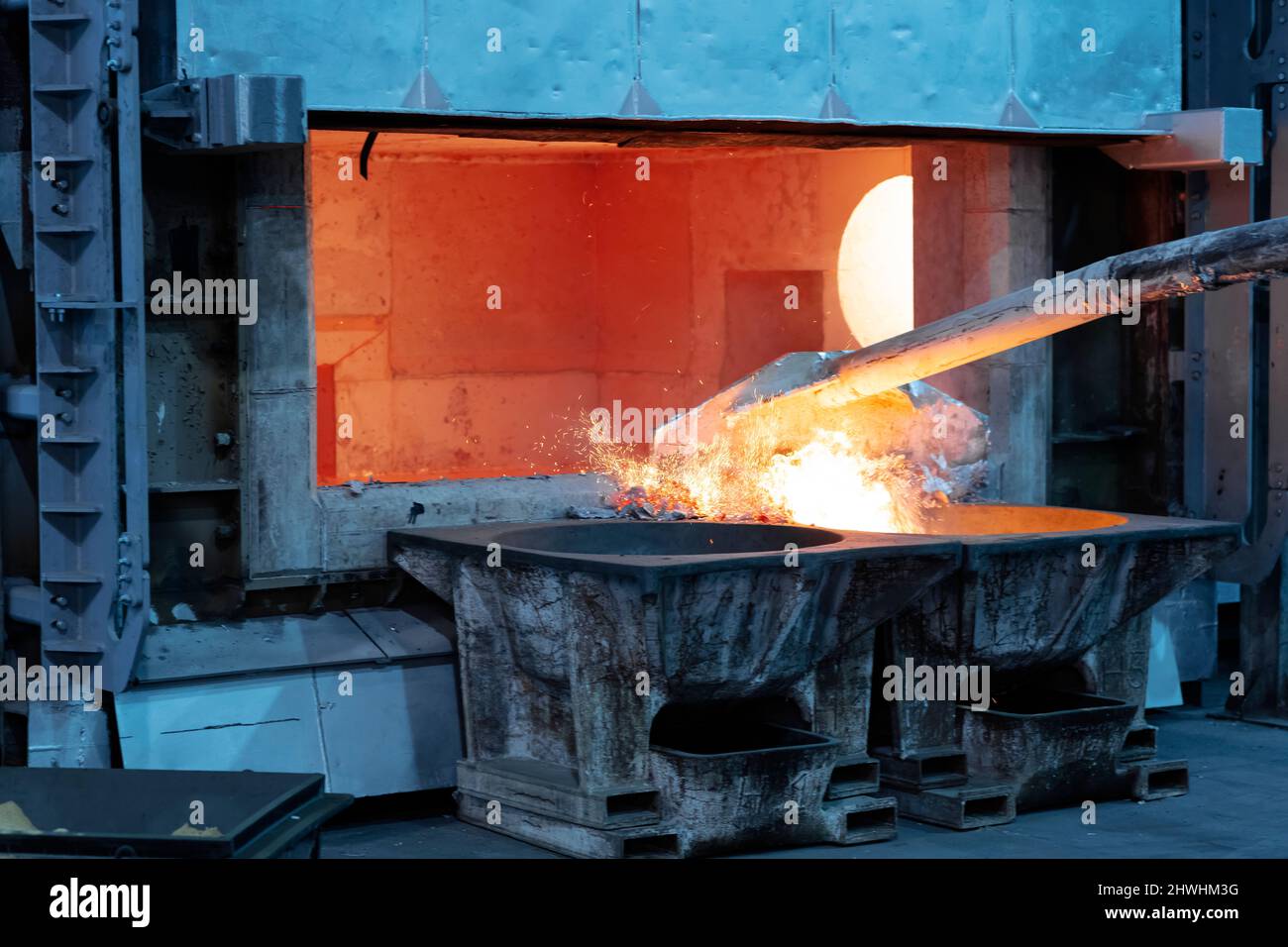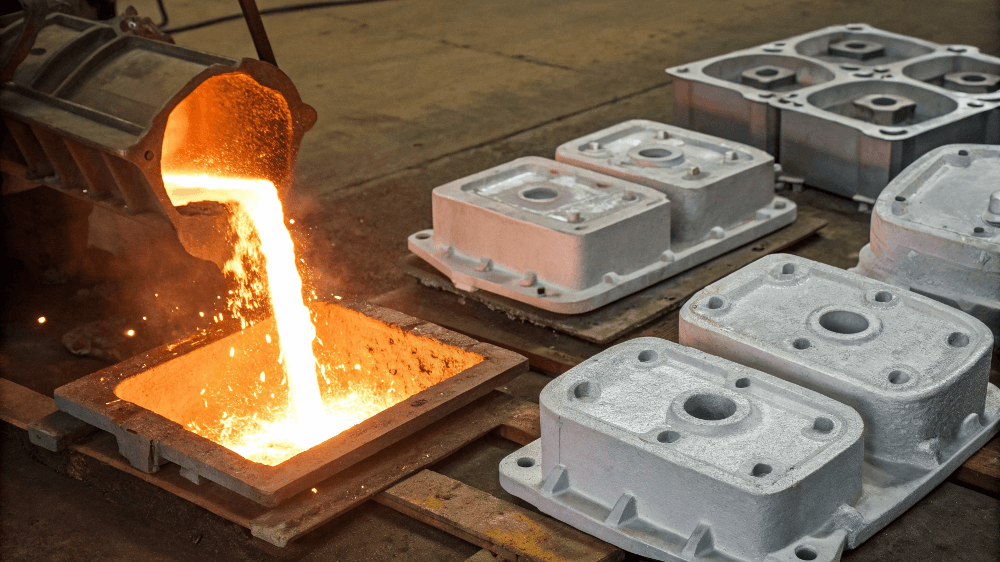Comprehending the Advantages and Innovations in the Aluminum Foundry Market
The Aluminum Foundry sector plays an essential duty in modern manufacturing. Its lightweight homes especially enhance fuel efficiency, specifically in aerospace and automobile industries. Furthermore, Aluminum's resistance to deterioration guarantees longevity in various applications. As the market progresses, technologies such as innovative recycling and additive manufacturing are reshaping production methods. Exploring these developments exposes not only the benefits however also the difficulties in advance for Aluminum factories in a quickly altering market.
The Lightweight Advantage of Aluminum
Aluminum's light-weight nature provides significant benefits across numerous industries, especially in production and transportation. Its low thickness allows for the manufacturing of parts that are much easier to handle and set up, causing minimized labor costs and improved efficiency. In the auto field, lighter vehicles add to enhanced fuel economy and reduced emissions, straightening with worldwide sustainability goals. In aerospace, the usage of Aluminum decreases the total weight of aircraft, which is critical for improving performance and lowering operational costs.
In addition, Aluminum's lightweight residential properties help with innovative layouts that were previously impractical with larger products. This versatility makes it possible for producers to develop complicated forms and structures while preserving structural stability. Overall, the lightweight benefit of Aluminum not only boosts product performance yet additionally drives developments in modern technology and design, making it a recommended material in different applications.
Deterioration Resistance and Resilience
The Aluminum Foundry industry is renowned for producing products with premium rust resistance, making them perfect for different applications. This residential property, integrated with enhanced structural integrity, adds to the lasting performance benefits that Aluminum elements offer. Consequently, industries progressively rely upon Aluminum to meet demanding environmental conditions without jeopardizing quality.
Superior Rust Resistance
While various steels encounter significant challenges from ecological variables, Aluminum stands apart for its exceptional rust resistance, making it a recommended selection in several applications. This home is largely due to a natural oxide layer that forms on the Aluminum surface area, supplying a barrier against moisture and harsh representatives. Unlike various other metals that may rust or deteriorate in time, Aluminum maintains its honesty also in severe environments, such as seaside areas or industrial settings. In addition, its light-weight nature incorporated with rust resistance makes it optimal for applications in aerospace, vehicle, and aquatic sectors. Generally, Aluminum's remarkable resilience not just improves product long life however likewise decreases upkeep prices, providing an engaging advantage for consumers and manufacturers alike.
Improved Structural Stability
Designers and designers progressively acknowledge the importance of improved structural stability in contemporary applications, where both deterioration resistance and longevity are important. Aluminum alloys, known for their light-weight residential or commercial properties, additionally display phenomenal resistance to rust, making them suitable for rough atmospheres. The cutting-edge techniques used in the Aluminum Foundry industry contribute significantly to producing elements with boosted toughness. Advanced casting processes and alloy structures are tailored to fulfill specific efficiency needs, making sure that frameworks can endure extreme problems without compromising stability. Surface treatments and finishings boost the life-span of Aluminum items, further mitigating deterioration over time. This concentrate on boosted architectural honesty not just expands the use of products yet additionally decreases maintenance costs, solidifying Aluminum's placement as a product of selection in numerous sectors.
Durable Performance Conveniences
Lasting efficiency in Aluminum elements is mainly associated to their premium deterioration resistance and durability. Unlike many steels, Aluminum naturally forms a protective oxide layer, which prevents rust and deterioration in various settings, including commercial and aquatic setups. This intrinsic residential or commercial property significantly expands the life expectancy of Aluminum items, reducing maintenance and substitute expenses. In addition, the light-weight nature of Aluminum enhances its applicability throughout markets without jeopardizing strength. The material's resistance to put on and tear likewise contributes to its integrity in requiring applications, making it an ideal selection for automobile, aerospace, and building industries. As sectors progressively prioritize sustainability and longevity, Aluminum's efficiency benefits line up with modern engineering demands, solidifying its role in cutting-edge manufacturing procedures.
Environmental Influence and Sustainability
 As the Aluminum Foundry sector develops, it increasingly focuses on ecological impact and sustainability, identifying the demand for liable practices when faced with environment modification. Initiatives to minimize waste and energy usage go to the forefront, with numerous factories embracing recycling campaigns to recover Aluminum scrap. This not just her response reduces basic material usage however also significantly cuts down power expense, as recycled Aluminum requires only a fraction of the power contrasted to main production.
As the Aluminum Foundry sector develops, it increasingly focuses on ecological impact and sustainability, identifying the demand for liable practices when faced with environment modification. Initiatives to minimize waste and energy usage go to the forefront, with numerous factories embracing recycling campaigns to recover Aluminum scrap. This not just her response reduces basic material usage however also significantly cuts down power expense, as recycled Aluminum requires only a fraction of the power contrasted to main production.Furthermore, improvements in discharges regulate modern technologies are being executed to decrease air toxins, aligning operations with stricter ecological regulations. Shops are additionally discovering different power resources, such as solar and wind, to power their centers sustainably. By fostering partnership with stakeholders, the market aims to establish ingenious services that enhance eco-friendly stewardship. Jointly, these campaigns highlight a dedication to lowering the Aluminum Foundry's carbon footprint while promoting a round economy within the production sector.
Advanced Manufacturing Techniques
 Changing manufacturing processes, the Aluminum Foundry industry is significantly incorporating advanced manufacturing methods to improve efficiency and precision. Strategies such as computer mathematical control (CNC) machining and additive manufacturing have become necessary components in optimizing manufacturing workflows. CNC machining permits high-precision component manufacture, greatly minimizing product waste and production time. Additive production opens up new opportunities for complex geometries and light-weight designs that were previously tough to accomplish.
Changing manufacturing processes, the Aluminum Foundry industry is significantly incorporating advanced manufacturing methods to improve efficiency and precision. Strategies such as computer mathematical control (CNC) machining and additive manufacturing have become necessary components in optimizing manufacturing workflows. CNC machining permits high-precision component manufacture, greatly minimizing product waste and production time. Additive production opens up new opportunities for complex geometries and light-weight designs that were previously tough to accomplish.Furthermore, the deployment of automation and robotics in Aluminum factories streamlines procedures, minimizes human error, and boosts employee security. These technologies assist in an even visit the website more receptive production setting, enabling producers to adapt promptly to market demands. The combination of innovative simulation software even more boosts the design and testing phases, leading to premium product quality. Collectively, these methods not just boost functional performance however additionally foster innovation, positioning the Aluminum Foundry industry at the forefront of contemporary production.
Technologies in Reusing Procedures
The Aluminum Foundry industry is not only progressing in making techniques yet is additionally making considerable strides in recycling processes. Innovations are arising to boost the effectiveness of reusing approaches, reducing energy consumption and improving sustainability. Advanced sorting technologies, such as automated optical sorting, allow the identification and separation of Aluminum from various other materials with high accuracy. This results in a better of recycled Aluminum, which is necessary for preserving the honesty of the end products.
Moreover, closed-loop recycling systems are being implemented, allowing manufacturers to recycle Aluminum scrap within their own manufacturing procedures. This minimizes waste and promotes a round economic situation. Additionally, study into new recycling methods, such as hydrometallurgical procedures, provides the possibility for recovering Aluminum from intricate waste streams. These technologies not only add to reducing the carbon impact of the Aluminum Foundry market yet also boost its economic stability in a progressively eco conscious market.
Applications Throughout Various Industries
Many industries are progressively identifying the versatility and advantages of Aluminum Foundry items, resulting in prevalent applications throughout industries such as automotive, building and construction, aerospace, and customer items. In the vehicle sector, Aluminum spreadings add to lightweight automobile designs, enhancing fuel effectiveness and performance. Aerospace suppliers utilize Aluminum components for their strength-to-weight ratio, crucial for aircraft structures and elements.
In building, Aluminum is favored for its longevity and resistance to corrosion, making it optimal for window frameworks, roof, and structural assistances. Durable goods likewise benefit from Aluminum Foundry items, as seen in cookware, electronics, and packaging, where lightweight and recyclable products are important.
The versatility of Aluminum Foundry methods enables detailed layouts and specific specs, satisfying the varied requirements of these markets. Consequently, Aluminum Foundry items are coming to be important check it out to modern manufacturing procedures throughout various industries.
Future Trends in Aluminum Foundries
As markets remain to progress, Aluminum factories are poised to welcome several key fads that assure to improve performance and sustainability. One noticeable fad is the boosting adoption of electronic technologies, consisting of automation and expert system, which streamline operations and boost quality assurance. In addition, the press towards lasting practices is leading shops to invest in reusing modern technologies, substantially minimizing waste and energy intake.
 An additional emerging pattern is making use of innovative alloys and materials, accommodating the growing need for sturdy and lightweight elements throughout numerous industries (Aluminum Foundry). The combination of additive manufacturing techniques is expected to transform part style, using customization and decreasing lead times.
An additional emerging pattern is making use of innovative alloys and materials, accommodating the growing need for sturdy and lightweight elements throughout numerous industries (Aluminum Foundry). The combination of additive manufacturing techniques is expected to transform part style, using customization and decreasing lead times.Collaboration with research study organizations is likewise expected to drive technology, as factories seek to establish new processes and products. Aluminum Foundry. Collectively, these patterns show a transformative future for the Aluminum Foundry sector, straightening with broader goals of sustainability and efficiency
Frequently Asked Questions
What Are the Normal Prices Linked With Aluminum Foundry Manufacturing?
The regular prices linked with Aluminum Foundry production consist of basic materials, labor, power, devices upkeep, and overhead costs. These aspects collectively influence the total monetary investment required for effective Aluminum casting operations.
How Does Aluminum Contrast to Various Other Steels in Toughness?
Aluminum, while lighter than numerous steels, exhibits excellent strength-to-weight ratios. Compared to steel, Aluminum is much less solid but provides superb deterioration resistance, making it a desirable option in applications where weight and toughness are crucial.
What Precaution Are in Place in Aluminum Foundries?
Precaution in Aluminum foundries typically consist of necessary personal protective tools, air flow systems to control fumes, normal devices maintenance, training programs for staff members, and adherence to stringent safety and security regulations to decrease dangers related to liquified metal handling.
How Is Quality Control Managed in Aluminum Spreading Processes?
Quality assurance in Aluminum casting processes entails extensive inspections at different stages, including raw material assessment, procedure tracking, and last product testing. Techniques such as statistical procedure control and non-destructive testing guarantee adherence to sector requirements.
What Certifications Are Essential for Aluminum Foundry Vendors?
The significance of accreditations for Aluminum Foundry distributors includes ISO 9001 for quality monitoring, ISO 14001 for environmental management, and industry-specific criteria like ASTM and SAE, guaranteeing conformity, safety, and dependability in producing processes.
The Aluminum Foundry sector plays an important duty in modern manufacturing. The Aluminum Foundry market is renowned for generating materials with premium deterioration resistance, making them optimal for different applications. Changing manufacturing procedures, the Aluminum Foundry sector is significantly integrating advanced manufacturing methods to boost effectiveness and accuracy. The Aluminum Foundry industry is not only progressing in manufacturing techniques yet is also making significant strides in reusing procedures. As sectors continue to evolve, Aluminum foundries are poised to welcome a number of key trends that promise to enhance effectiveness and sustainability.